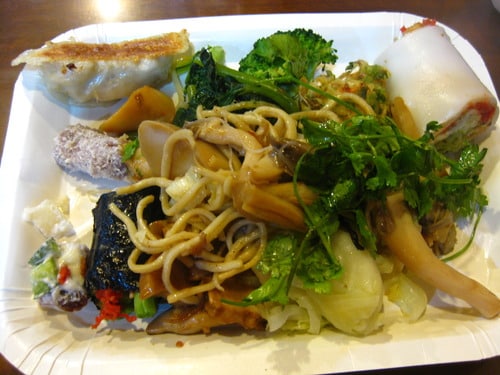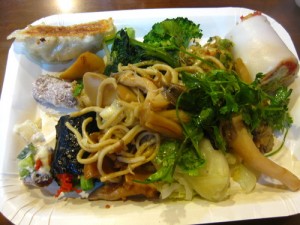As I parted the cooked spinach with my chopsticks, I noticed little shredded bits nestled between the leaves. I hoped against hope that it was garlic. It wasn’t. I sighed, and prepared the phrases again in my head.
“I ordered no meat,” I told the waitress in Chinese, gesturing at the bits of pork. “Like I said, I’m vegetarian.”
“Oh, you can just take it out,” she said, shrugging.
As a vegetarian from birth, the idea of just taking out the meat, leaving its residue on everything else I am to eat, makes my head swim.
People always ask me the same question when they hear I’m going to China, or have just got back: “What do you eat there?” Sometimes, they don’t even know I’m vegetarian. They’ve just heard stories of animals or parts of animals that they’ve never even imagined being served on a plate. In a way, I don’t have to deal with all that. I hear my friends complaining about the way meat is cooked, the way fish is served, the way the menu is confusing. I just turn to the server and ask my question. “Can you recommend me something vegetarian?”
I also get the opposite end of the spectrum—some friends, especially the Chinese-American ones, hear I’m going to China and exclaim, “I’m SO jealous of all the food you get to eat!! The chicken! The fish! The dim sum…” Before their eyes grow too large in their rapture I cut in and mention that I’m vegetarian, but am still excited for all the other food—and in the case of dim sum, the egg tarts. They give me a pitying look, as if I’ve just informed them that I have lost my ability to taste. “Oh,” they say. “Well…hope you see a lot of sights?”
In Chinese, “I’m vegetarian” is “wo chi su 我吃素.” The character “素” literally means plain, simple, and elementary. That’s pretty indicative of how most Chinese people feel towards the idea of living your life without meat. Why be plain and elementary, my dear Watson, when you could be extraordinary? Meat is a sign of social standing. Meat means you have the means to eat well. So, not eating meat, I’m down there on the social ladder fraternizing with the rabbits. And I love it.
I actually love Chinese food. I have to be alternately demanding and cajoling in getting it in a vegetarian format, but I’m willing to do it. For one thing, it gives me an opportunity to practice Chinese. How many ways can I tell someone I am vegetarian? I know there are at least five off the top of my head right now, one involving pretending I am Buddhist.
There are some great Buddhist vegetarian buffets in China, usually very cheap (like $2-$3 USD) and all-you-can-eat (food pictured above). The problem is, I don’t always end up at those places because eating in China is usually a very social activity. You have your round table that’s all Lazy-素san, and you need to find a way to pacify everyone around the table when you order, since everyone shares everything.
You’d think, being a vegetarian, it would be really annoying to order that way. But I’ve found that, actually, what makes it hard to eat in China is really how picky you are. I have my rule—no meat, no fish—and that’s all I have to stick to. It’s sometimes tough to communicate, but I have patience and I do it. But sometimes, people have very specific requests—they hate eggplants, they don’t like dishes that are too hot, they think it’s too oily, they think it’s not cooked enough, they hate tofu, and the list goes on. I spent two summers in China with a friend who had food allergies that you could count on all ten fingers, but in the end we found that we were less picky than the average laowai sitting at our table.
So to the vegetarians who go to China—don’t worry. Communicate with the waiters more—you’ll get to practice your Chinese! Make sure your friends know you’re vegetarian, and make THEM get the scorpions on a stick at Wangfujing Snack Street, so you have someone to take crazy pictures of. Marvel at mock meat even if you don’t want to eat it, and eat your heart out of vegetarian mapo doufu, spicy eggplant, broccoli with garlic, mushrooms, green beans with chili peppers, stinky tofu, veggie steamed buns, and dumplings. And when the fruit comes at the end of the meal, and everyone else is stuffed but you still have room for more—go crazy on that watermelon. You deserve it.
当我用筷子将菠菜分开的时候, 我注意到有小块小块的东西在叶子之间. 我知道不太可能, 但我还是希望那是大蒜. 但它不是. 我叹气. 并在脑海中准备我等会儿要讲的话.
“我说不要肉,” 我用中文跟服务员说, 指着小块的猪肉. “就像我说的, 我吃素.”
从出生起即是素食者, 我想到要把肉挑出来,挑剩的东西在我要吃的东西上面, 就让我头晕.
人每次听我要去中国或刚从中国回来都问我一样的问题:“你在那边吃什么?”有时候, 他们甚至不知道我吃素. 他们只是听过故事描述他们从来没有想像过的动物部位当成菜肴. 某一方面而言
我不用去面对那些. 我听过我朋友抱怨中国煮肉的方式, 鱼烹煮的方式和令人困惑的菜单.但我只要问服务员“你可以建议我一些素食料理吗?”
但是我也听过相反的说法. 有些朋友, 特别是华裔美国人, 听到我要去中国就惊叫道“我好羡慕你可以吃那么多食物!鸡肉!鱼肉!港式饮茶…” 在他们眼睛张大之前我会打断他们并告诉他们我吃素, 但还是很期待其他食物- 像是港式点心和蛋塔. 他们会用可怜的眼神看我, 仿佛告诉我我丧失了品尝的能力. “欧”他们说. “我希望你能参观很多景点?”
中文里, “I am vegetarian”的中文是“我吃素”. 素这个字代表着简单, 平淡和基础. 这几乎代表着大多数中国人对不能吃素的人的看法, 为什么你能出众的时候你要选择平淡无奇呢?肉是社会地位的一个象征. 肉代表你可以吃的好. 所以不吃肉的我在社会阶梯的下面跟兔子社交.而且我很喜欢这样.
我其实很爱中国菜。 我需要另类的要求或请求别人才能要到素菜, 但是我愿意这么做. 它让我有机会练中文. 有几种方式可以告诉别人你吃素? 我想在就能想出五种. 其中一种包括假装我是佛教徒.
在中国有一些很好的佛教素食自助餐, 它们通常都很便宜(大概2-3块美金)-而且是吃到饱. 问题是, 我通常不会去那些地方因为在中国吃饭通常是社交活动.圆桌全部都是素菜,而且当你点菜的时候你还要找到方法让每个人都开心,因为每个人都要一起吃.
你可能觉得当一个吃素的人, 点菜很麻烦. 但是我发现, 在中国吃饭困难的地方在于你有多挑食. 我有我的规则- 不吃肉不吃鱼, 那是我要遵守的. 有时候很难沟通,但是我有耐心而且我会这么做. 有时候人会有特定要求- 他们不喜欢茄子, 他们不喜欢太烫的菜, 他们觉得太油了,他们觉得菜不够熟, 他们讨厌豆腐, 清单越来越长. 我花了两个暑假跟一个对十只手指头都数不完的食物过敏的朋友在一起, 但最后我发现我们比普通老外还更不挑食.
所以要去中国的素食者不要担心. 跟服务员多沟通- 你可以练习你的中文!确定你的朋友知道你吃素, 并强迫他们在王府井小吃街点蝎子所以你才有人让你拍疯狂的照片. 就算你不想吃素肉, 你也可以对它叹为观止并大吃麻婆豆腐, 辣茄子, 大蒜花椰菜, 香菇, 青椒绿豆, 臭豆腐, 菜包, 和水饺. 当水果最后上的时候, 每个人都吃得很撑只有你还没饱的时候, 大吃西瓜. 因为你值得.



